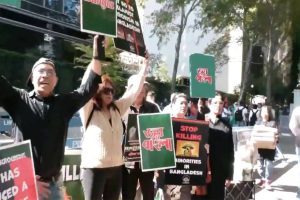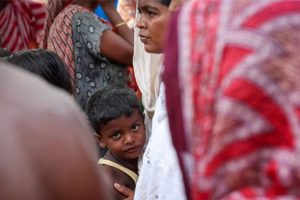In a powerful appeal to the global community, Hindu American groups flew a massive airline banner, calling for urgent global action to stop the ongoing genocide of Hindus in Bangladesh.
The large banner flew over the Hudson River and circled the Statue of Liberty, a global symbol of human dignity, freedom, and equality.
The 1971 genocide, as documented by US Congress Resolution HR 1430 in 2022, claimed 2.8 million lives and saw at least 200,000 predominantly Hindu women raped, leaving an indelible mark on the region.
Since then, Bangladesh’s Hindu population has dwindled from 20 per cent in 1971 to just 8.9 per cent today.
Recent reports of targeted violence, systematic impoverishment, lynchings, kidnappings of minor girls, and forced job resignations affecting up to 200,000 Hindus, along with property seizures, pose a serious existential threat to the 13 to 15 million Hindus living in the country.
Since August 5, 2024, there have been around 250 verified attacks and over 1,000 reported incidents.
Sitangshu Guha, from the Bangladesh Hindu Community and one of the event organisers, highlighted the threat and stated, “Hindus in Bangladesh are on the verge of extinction. Hopefully, this will raise awareness among the civilised world and prompt the UN to take action to save the victims of militant Islamic forces in Bangladesh. If Bangladesh becomes Hindu-free, it will become Afghanistan 2.0, and militants will spread to neighbouring India and other parts of the world, including the West. This is everyone’s problem.”
Pankaj Mehta, another activist and member of the Interfaith Human Rights Coalition who helped organise the event, added, “It is time for the UN Human Rights Council to put aside politics and officially recognise the 1971 Bangladesh genocide, the largest genocide since World War II. Three US-based organisations–The Lemkin Institute for Genocide Prevention, Genocide Watch, and the International Coalition of Sites of Conscience–have already recognised the atrocities committed by Pakistani occupation forces and their Islamist allies in 1971 as genocide, primarily targeting the Hindu minority. The UN must follow suit and take steps to prevent another looming genocide.”
Surjit Chowdhary, founding member of Sree Gita Sangha in New Jersey, US, urged the Bangladesh government to stop all violence against the Hindu community and address political differences through democratic processes.
The rise of Islamist fundamentalism in Bangladesh poses a serious threat to India, as it has the potential to spread through porous borders, affecting West Bengal and beyond, with existing ties between radical forces on both sides.
It is also raising concerns among mainstream Americans, similar to the anxieties seen during the Afghanistan crisis. Humanitarian watchdogs are closely monitoring the worsening conditions in Bangladesh, fearing that escalating violence could lead to a full-scale genocide.
Americans are being urged to boycott Bangladeshi garments, which account for 85 per cent of the country’s export earnings, until the violence ceases and the perpetrators are brought to justice.
A plea has been made to executives of major buyers of Bangladeshi garments–such as Walmart, H&M, Gap Inc., Target, PVH Corp, and VF Corporation–to halt shipments from Bangladesh, as economic support for the country today is seen as enabling terrorism against Hindus and other minorities.
The Jewish community in America has also expressed solidarity with the Hindu minority, drawing parallels to the atrocities committed by Hamas terrorists in Israel. Just as the world rallied against extremist violence in Israel, many are now calling for immediate intervention in Bangladesh to prevent further atrocities.
The event was live-streamed on StopHinduGenocide.org, where all atrocities are being methodically documented, along with historical context and the ominous future facing Bangladesh’s Hindus unless the global community takes action.





